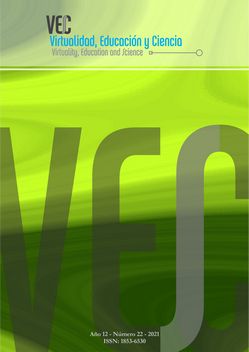New leadership training in the region. The experience of “The Academy of Political Innovation
DOI:
https://doi.org/10.60020/1853-6530.v12.n22.32119Keywords:
online education, ICT, leadership training, e-Learning, political innovationAbstract
The purpose of this article is to share some reflections about training courses mediated by information and communication technologies (ICT). Several of these reflections and considerations emerge from the learning experiences in the framework of the creation and development of the Academy of Political Innovation. The academy emerges from an investigation held by “South Affairs”, in which 165 training programs for political and social leaders were mapped in Latin America. “South Affairs” not only profited from the knowledge acquired during several years of fieldwork, but it also enhanced the training courses with practical tools while adding the know how in political innovation to train future regional leaders.
References
ACUÑA ESCOBAR, CARLOS ENRIQUE (2018). Deserción escolar en educación a distancia: datos de estudio. Disponible en: http://vinculando.org/educacion/desercion-escolar-en-educacion-a-distancia-datos-de-estudio.html
BIANCHI, M., PERINI, A., LEÓN, C., Y BARLASSINA, M. (2016). Liderazgos para el Siglo XXI. Una mirada a los programas de formación política en América Latina. Buenos Aires: Asuntos del Sur.
CEPAL (2017). “Estado de la banda ancha en América Latina y el Caribe 2017”. Disponible en: https://www.cepal.org/es/publicaciones/43365-estado-la-banda-ancha-america-latina-caribe-2017
DIÁLOGO INTERAMERICANO (2019). “Transformando la experiencia de aprendizaje a través del uso de la tecnología educativa: Desafíos y oportunidades en América Latina”. Grupo de Trabajo sobre Tecnología e Innovación en la Educación. Primera Edición. Disponible en: https://www.thedialogue.org/wp-content/uploads/2019/12/Transformaci%C3%B3n-Layout-1.pdf
GARCÍA-ARETIO, L. (2019). El problema del abandono en estudios a distancia. Respuestas desde el Diálogo Didáctico Mediado. Revista Iberoamericana de Educación a Distancia, 22(1), 245–270. Disponible en: http://dx.doi.org/10.5944/ried.22.1.22433
MALDONADO, R. (2009). Sobre la retroalimentación o feedback en la educación superior online. Revista virtual Universidad Católica del Norte, 26, 1-18 Disponible en: http://redalyc.org/pdf/1942/194215516009.pdf
NÚÑEZ-URBINA, A. (2020). La educación en línea y el rol de la motivación. Revista Transdigital, 1(1). Disponible en: https://www.revista-transdigital.org/index.php/transdigital/article/view/8/11
SCHWARTZMAN, G (2009). “Aprendizaje Colaborativo en Intervenciones Educativas en Línea: ¿Juntos o Amontonados?”, en Pérez, S. e Imperatore, A. Comunicación y Educación en entornos virtuales de aprendizaje: perspectivas teóricas y metodológicas, Universidad Nacional de Quilmes Ediciones, 2009. Publicación completa en http://www.virtual.unq.edu.ar/sites/default/files/com_data/investigacion/Libro%20EVA%20final.rar Disponible en: http://www.pent.org.ar/publicaciones/aprendizaje-colaborativo-intervenciones-educativas-linea-juntos-amontona
SCHWARTZMAN, G.; TARASOW, F. y TRECH, M. (2013): “Dispositivos tecnopedagógicos en línea: medios interactivos para aprender”, en: GARCÍA, J. M. y RABAJOLI, G. (comps.) Aprendizaje abierto y aprendizaje flexible. Más allá de formatos y espacios tradicionales (pp. 163-184). Montevideo: ANEP - CEIBAL.
TARASOW, F. (2010). “¿De la educación a distancia a la educación en línea? ¿Continuidad o comienzo?”, en Módulo: Diseño de intervenciones educativas en línea, Carrera de Especialización en Educación y Nuevas Tecnologías. PENT - FLACSO Argentina. Disponible en: http://www.pent.org.ar/institucional/publicaciones/educacion-distanciaed.
Downloads
Published
Issue
Section
License
Copyright (c) 2021 María José Barlassina

This work is licensed under a Creative Commons Attribution-NonCommercial 4.0 International License.
The generation of derivative works is allowed as long as it is not done for commercial purposes. The original work may not be used for commercial purposes.


